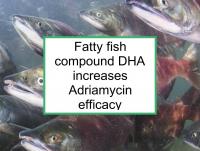Fatty fish incorporate the marine omega-3 fats docosahexaenoic acid (DHA) and eicosapentaenoic acid (EPA). Fatty fish consumption has been shown to be associated with reduced risk of breast cancer and improved survival. Marine fatty acids have also been found to enhance the therapeutic effects of some chemotherapy drugs.
Now a new study has reported that DHA improves the effectiveness of doxorubicin in triple negative breast cancer cells.
There is some evidence that fish oil supplements taken during doxorubicin chemotherapy do not prevent heart damage and might actually promote it. Doxorubicin and other anthracycline chemotherapy can cause cardiomyopathy, damage to the heart muscle that weakens its ability to pump and can lead to heart failure. Contrary to expectations, fish oil supplements might actually increase the risk of doxorubicin-induced chemotherapy. In one study, sheep given fish oil displayed more signs of anthracycline cardiotoxicity than control sheep.
Research finds DHA enhances doxorubicin effectiveness in TN cells
The study referenced at the beginning of this news article was designed to investigate the effects of DHA and EPA on three types of breast cancer cells. Triple negative MDA-MB-231, hormone receptor positive MCF-7, and HER2 positive SKBr-3 cells were incubated with EPA or DHA and with or without doxorubicin or trastuzumab (Herceptin).
Both DHA and EPA were found to inhibit the growth of all three breast cancer cell lines in a dose-dependent manner. On the other hand, neither DHA nor EPA altered the growth or metabolic activity of normal breast cells. Pre-treatment with DHA, but not EPA, improved the efficacy of doxorubicin in triple negative cells, but not the other cell lines. The authors conclude that treatment of triple negative breast cancer cells with DHA increases the anti-cancer effects of doxorubicin.
Please see our article on breast cancer diet during doxorubicin chemotherapy for more information.
